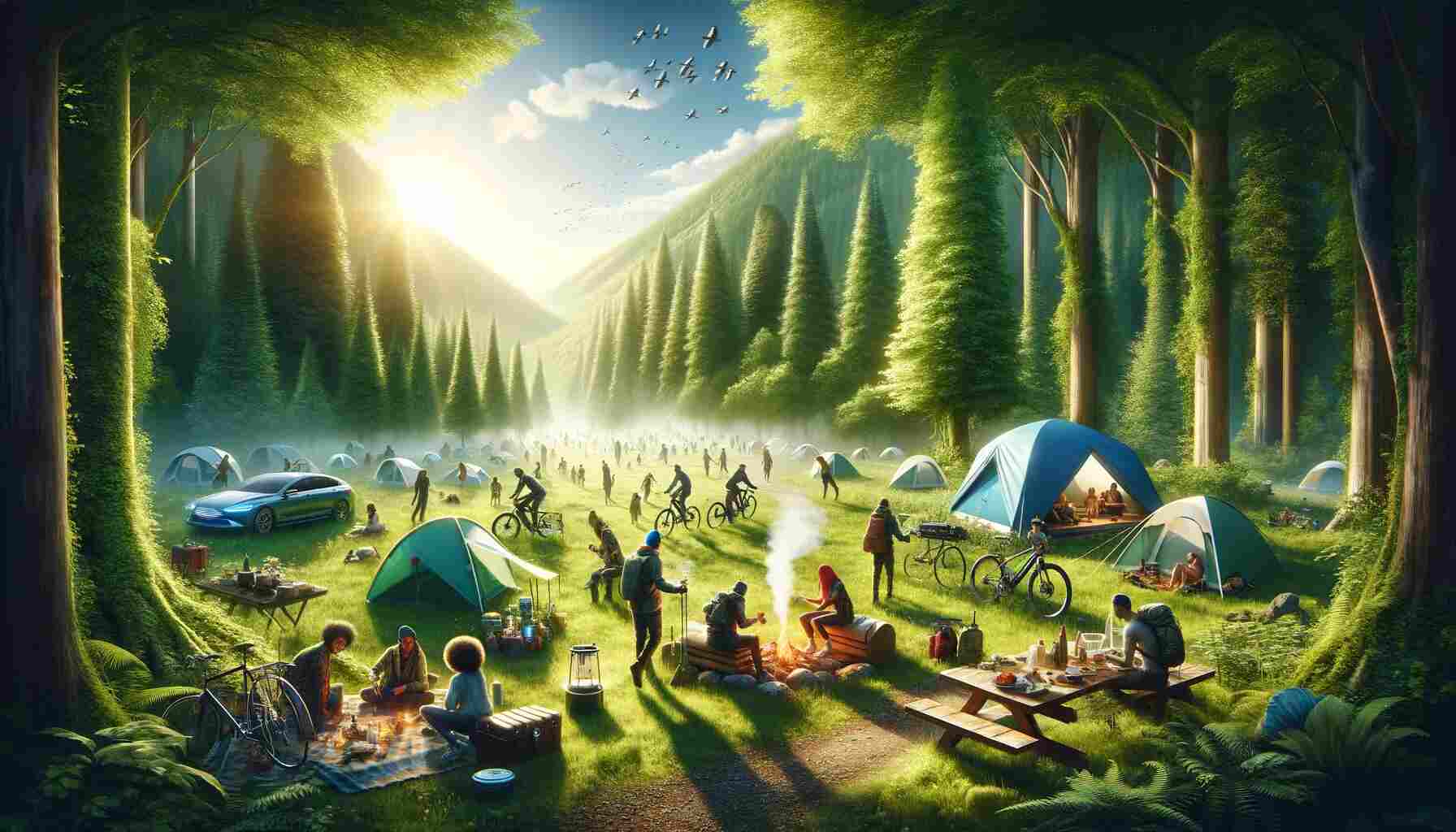As we step into 2024, the camping landscape is witnessing a transformative shift towards a more sustainable and intimate nature experience. Car-less camping, an eco-friendly approach to outdoor adventures, is at the forefront of this change. This article delves into this emerging trend, exploring its significance, benefits, and how you can join the movement for a greener footprint in the wilderness.
Understanding Car-Less Camping
Car-less camping is a concept that goes beyond mere recreation; it’s a conscientious choice to reduce one’s carbon footprint while enjoying the pristine beauty of the natural world. In recent years, there has been growing recognition of the environmental impact associated with traditional car camping. This has led to a surge in interest in car-less camping as an eco-friendly alternative.
Car-less camping is about immersing oneself in nature while minimizing the negative ecological consequences associated with vehicular travel. It encourages campers to rely on more sustainable modes of transportation, such as public transit or even hiking, to reach their camping destinations. By doing so, campers reduce greenhouse gas emissions, noise pollution, and habitat disturbance, all of which can harm the fragile ecosystems they seek to enjoy.
The Surge in Public Transportation-Accessible Campsites
One of the key drivers of the rise of car-less camping is the increasing availability of campsites accessible via public transportation. Campgrounds and parks around the world are recognizing the demand for such options and are making efforts to accommodate eco-conscious travelers.
For example, Dash Point State Park in Washington State, USA, has implemented measures to encourage car-less camping. It is accessible by bus from nearby cities, making it an attractive option for those who prefer to leave their cars behind. Similarly, Camping-Ferien Wang in Switzerland has become a prime destination for car-less campers due to its proximity to efficient public transportation networks.
These developments signal a positive shift in the camping industry towards sustainability. Campsite operators are acknowledging the importance of providing access to natural beauty without the need for personal vehicles. This not only reduces the carbon footprint of campers but also fosters a greater sense of connection between people and the environment.
Benefits of Going Car-Less
Car-less camping offers numerous benefits, both for the individual camper and the environment. Here are some of the key advantages:
- Escape from Technology and Urban Life: Car-less camping provides an escape from the constant connectivity of modern life. Without the distractions of smartphones and the hustle and bustle of urban living, campers can fully immerse themselves in the tranquility of nature. It offers a chance to unwind, de-stress, and reconnect with oneself.
- Access to Remote and Unspoiled Locations: Many car-less camping destinations are located in more remote and less-visited areas. These places often remain pristine and untouched due to their inaccessibility by car. By choosing a car-less approach, campers can explore these hidden gems, enjoying the serenity of the wilderness without the crowds.
- Reduced Ecological Footprint: Perhaps the most significant advantage of car-less camping is its positive impact on the environment. By opting for public transportation or hiking, campers significantly reduce their carbon emissions. This reduction in vehicular traffic around campsites helps preserve the natural habitats and minimize disturbance to wildlife.
- Physical Activity and Adventure: Car-less camping often involves hiking or other physically demanding activities to reach the campsite. This adds an element of adventure and physical fitness to the camping experience, making it more rewarding and memorable.
- Cost Savings: Campers can also save money by going car-less. They eliminate the expenses associated with fuel, maintenance, and parking fees. Additionally, campgrounds accessible by public transportation may offer discounts or incentives for travelers who choose eco-friendly transportation options.
- Deeper Connection with Nature: When you rely on your own physical effort or public transportation to access a campsite, you form a deeper connection with the natural world. You become attuned to the environment, its sounds, and its rhythms, enhancing the overall camping experience.
How to Plan a Car-Less Camping Trip
Planning a car-less camping trip requires a bit more preparation compared to traditional car camping. Here are some steps to help you plan your eco-friendly adventure:
- Choose Campsites Wisely: Start by researching campgrounds that are accessible by public transit or within a reasonable hiking distance from your starting point. Look for online resources, guidebooks, or camping forums to find suitable options.
- Pack Light: Since you won’t have the luxury of a car to carry excess gear, it’s essential to pack light and efficiently. Focus on the essentials, including a sturdy tent, sleeping bag, cooking equipment, and appropriate clothing. Invest in compact and lightweight gear to make carrying it on foot or on public transport more manageable.
- Plan Your Route: If you’re using public transportation, familiarize yourself with schedules, routes, and any necessary reservations. Make sure you know how to reach the campsite and return home. Be prepared for potential delays and have contingency plans in place.
- Consider Food and Water: Depending on your camping location, you may need to carry food and water with you. Plan your meals and bring lightweight, non-perishable food items. Be mindful of Leave No Trace principles and pack out all your waste.
- Safety and Communication: Inform someone you trust about your camping plans, including your destination and expected return date. Carry essential safety gear, such as a first-aid kit, map, compass, and a charged phone (if applicable).
- Leave No Trace: Embrace the Leave No Trace principles, which encourage responsible outdoor ethics. Pack out all trash, respect wildlife and vegetation, and minimize your impact on the environment.
The Future Outlook
The trend of car-less camping is not just a passing fad; it represents a broader movement towards sustainable tourism and responsible travel. As awareness of environmental issues continues to grow, we can expect more campgrounds and parks to adapt and cater to this eco-friendly approach.
Campsite operators and park authorities are recognizing the value of providing access to nature without the need for private vehicles. They are investing in infrastructure to support public transportation access, developing hiking trails, and promoting car-less camping options. This trend is a positive response to the increasing demand for environmentally responsible outdoor experiences.
Embracing the Change
Car-less camping offers a unique opportunity to reconnect with nature in a responsible and sustainable manner. As we continue to navigate the challenges of environmental conservation, this approach to camping presents a pathway to enjoy the great outdoors while preserving it for future generations.
By choosing to camp without a car, we take a significant step towards protecting our planet and enjoying its beauty in a more respectful and sustainable way. It’s a way to embrace the change and contribute to a greener future for our beloved natural spaces.
In conclusion, car-less camping is not just a trend for 2024; it’s a vital part of the evolving relationship between humans and the natural world. It represents a conscious choice to reduce our environmental impact and make camping more about the experience of nature itself. So, whether you’re a seasoned camper or someone looking to try camping for the first time, consider going car-less on your next adventure. You’ll not only enjoy the many benefits of this eco-friendly approach but also play a role in preserving the beauty of our planet for generations to come.










